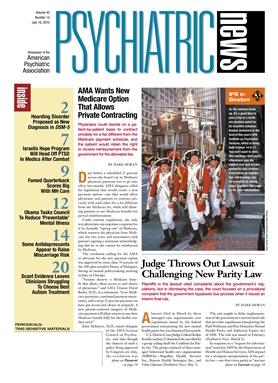With just two drugs having been approved for the treatment of only a small portion of symptoms associated with autistic spectrum disorders (ASDs), many clinicians struggle to find effective methods to manage disruptive and vexing symptoms such as aggression, agitation, sleep and mood disturbances, and repetitive behaviors.
At APA's 2010 annual meeting in New Orleans in May, Chris McDougle, M.D., gave a lively presentation to a full house of attendees on pharmacotherapeutic options for treating both pediatric and adult patients with ASDs.
McDougle is the Albert Eugene Sterne Professor of Clinical Psychiatry, chair of the Department of Psychiatry, and director of the Section of Child and Adolescent Psychiatry at Indiana University School of Medicine.
Only risperidone and aripiprazole are approved by the Food and Drug Administration for irritability associated with ASD in children aged 6 or older. No other medications have been approved for treating any aspects of ASD.
Among the many symptoms seen in autism patients, some can be controlled and managed by pharmacological interventions. These symptoms include motor hyperactivity and inattention; interfering ritualistic behavior; aggression, self-injury, and property destruction; and mood and sleep disturbances. “This is not to minimize the importance of nondrug treatments by any means,” said McDougle.
For motor hyperactivity and inattention, McDougle suggested first using alpha2 agonists, namely guanfacine and clonidine, for their favorable efficacy and safety profiles. These drugs may cause sedation and hypotension, however, and patients should be closely monitored. Atomoxetine is another potentially useful option.
Stimulants, in contrast, which are commonly used to treat attention-deficit/hyperactivity disorder, can worsen these symptoms and tics in many autism patients. Thus, stimulants should be started with caution. “The goal [of using these drugs] is primarily to reduce hyperactivity,” said McDougle. “These drugs by themselves are not very effective in treating aggression or self-injury.”
Risperidone and aripiprazole have the most evidence to support their use for treating ASD-associated irritability in children and adolescents with autism, McDougle noted. In this case, irritability refers to aggression, self-injury, severe tantrums, or severe mood swings associated with ASD. Other first- and second-generation antipsychotics may also relieve irritability with varying efficacy and safety profiles, with notable concerns about weight gain, metabolic disturbances, extrapyramidal symptoms, and cardiac side effects in children and adolescents.
Alpha2 agonists such as guanfacine and clonidine may have some benefits on irritability as well, but few or no data support the use of mood stabilizers, anticonvulsants, or naltrexone.
Treating Ritualistic Behaviors
Ritualistic, repetitive behaviors, including hand-flapping, rocking, and lining things up, are hallmark symptoms in ASDs and often vary by patient. “Many times patients do it in order to feel better and … reduce anxiety and irritability,” said McDougle.
Although such behaviors may bother the patient's parents, he suggested that clinicians should determine whether they serve as a form of relief for the patient rather than automatically trying to suppress or eliminate the behaviors, unless they interfere with other key aspects of the patient's functioning.
Repetitive behavior in most autism patients is different from obsessive-compulsive disorder symptoms, he emphasized, noting that studies have produced conflicting data on the effectiveness of selective serotonin reuptake inhibitors (SSRIs) in reducing repetitive behavior. Citalopram, for example, was found to be no different from placebo in a large, controlled study of children and adolescent patients. McDougle and colleagues have found fluvoxamine to be helpful in adult but not pediatric patients. Nevertheless, individual patients may respond clinically to an SSRI, he pointed out.
In addition, risperidone and aripiprazole are more effective than placebo in reducing stereotypical behavior in large, controlled clinical studies, according to McDougle. “Beyond that, the field doesn't have great ideas,” he said.
Little Research Done on Mood Disorders
Mood disorders are not uncommon in patients with ASDs or developmental disabilities, but they are often undiagnosed because of communication difficulties between the patient and the clinician, and so far they haven't been studied by researchers, according to McDougle. When SSRIs or antiepileptic drugs are initiated in younger patients, he cautioned, clinicians should be mindful to monitor for suicidal ideation, even if the patient may not be able to articulate it.
In addition, sleep disturbance is common in autism patients, and McDougle recommended melatonin, clonidine, or trazodone as first-line treatment options. Clinicians prescribing trazodone should be alert to the risk for priapism, he advised.
Inappropriate sexual behavior in post-pubertal autism patients can be troubling and very difficult to manage. McDougle pointed out that autism is not a children's disease, even though it is often perceived so. Many adult patients have “mature sexual function with immature sexual judgment,” he said. Hormonal therapies and high-dose SSRIs are tried for some patients but rarely work well. “Generally I haven't had success with pharmacological approaches” to sexual-behavior problems in autism patients, he acknowledged.
He also said that behavioral interventions can be helpful for some patients, but challenges remain in using them effectively.
Unfortunately, the core symptom of ASDs, social impairment, remains pharmacologically untreatable at this time, he noted. Researchers are, however, pursuing a number of promising pharmaceutical and behavioral approaches that may offer hope for patients and families in the near future.

